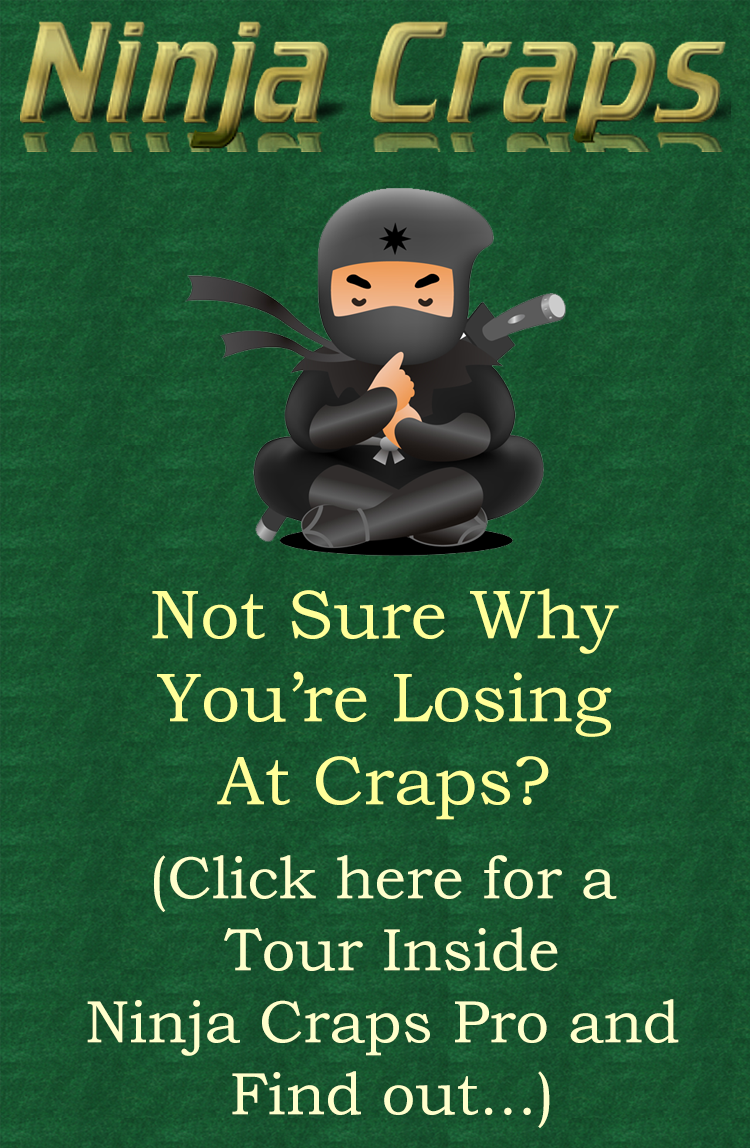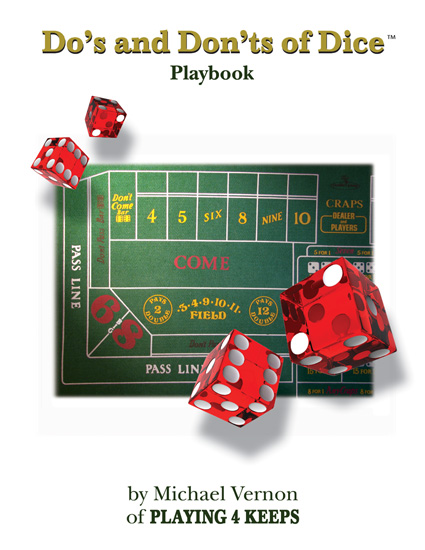|
Feeling Groovy ...
BY: Michael Vernon
Either with a random roll or with dice influencing, the dice roll delivers a subtle detectable message. It comes down to strong, confident energy verses weak, wimpy energy. Consistency in tossing the dice goes a long way to being able to hold onto the cubes. Consistency expresses a kind of energy that rides with intention, grooved in like a wagon wheel in a rut. The longer any shooter holds the dice, the longer the game plays and pays. When you have the feeling that you or another shooter, are "in the groove", it is a powerful confidence that allows you to really lean into the hand. You know that you are switched-on and you know that you have it going your way. You can train yourself to learn what "in the groove" feels like.
You can observe energy in the toss of the dice. Sometimes it is so obvious with a toss as you witness wimpy energy. You can tell by the way the dice stumble down the layout, that the shooter will not be rolling for very long. Sloppy dice tossing is usually an indication of a short hand. I look for shooters who command control and roll with consistency. They look like winners and shoot like winners. The next time that you are out, take notice of all the different ways that people toss the dice. See if you can observe the differences in energy from player to player. Notice if the sloppy, weak toss does not result in a short hand, while the strong consistent toss produces better results.
I have witnessed long hands with a dice setter or a random roller. The dice consistently landed in the same area with the same force. It is critical to have consistency with intention with every throw when setting the dice. It looks and feels like there is no stopping the shooter. Each grip, pick-up, release and landing is a mirror image of the previous throw. It is a thing of beauty when you witness a hand "in the groov". It begins with the shooter throwing the dice with consistency.
I have experienced being in the groove many times. I have had the experience of knowing that my point was going to roll while the dice were still in the air. I just knew it. I could feel it. I could see it in my mind's eye. I have also experienced that "oh, no", feeling, as the dice left my hand, knowing that my release was not right. I could feel something was wrong and the seven was coming down upon landing. You can train yourself to become this sensitive with the dice. It is a feeling that comes with practice and develops with an awareness of the experience as it is happening.
Your training begins by first witnessing a long roll. You must see one to know what one "feels" like. Knowing that you are in the groove or witnessing another player in the groove comes from an awareness of how it affects your feelings. As the hand develops, there will be energy expressing itself, like a signature for the experience. You can tap into how that energy feels during a good roll. Recognizing the experience creates familiarity. Familiarity as a feeling allows identification of the experience. I called it "I've seen this movie". You perceive the information metaphysically and experience the information as a feeling. The feeling translates into information.
It is important to note that getting into the groove is all about detachment. It certainly does not involve more thinking or engaging of emotions. It is an energy "thing" as you become a clear vessel allowing free flow to occur. You are able to take charge by releasing the conscious need to be in charge. You have to let go and trust in your ability and skill. There is such a thing as over-thinking the details. Ego and intellect get in the way of free flow. Practicing detachment, you are better able to perceive the energy and recognize how it feels as you release ego and intellect.
This idea of detachment is different from how I understand what others mean by "in the zone". Detachment means to disengage from the idea of making the toss of the dice a conscious effort. It should be a fluid, automatic exercise, as natural as writing your name. When detached, you can be asked a question by the dealer, you can handle a remark from the boxman, you can hi-five with a zealous player next to you, and order a beverage from the cocktail server. You can do all of these things and not have it distract from your mission. Throwing the dice now comes from the automatic part of your consciousness, like driving a car. It is just you, the dice, and the table. Everything else is superfluous because you are not affected, you take no notice, and nothing can shake you. You own a belief, one of total confidence and skill. You have an inner knowing that your body will take you there. You do not believe that if something or someone penetrates your sacred concentration that it will take you out of "the zone" and thus end the hand. Detachment, from what may be called distractions, anchors your confidence firmly in your skill. Focused from the time the stickman passes the dice to you, to the pick-up and then to the landing, your energy is in the dice. You groove in with a metaphysical alignment, just you and the dice like two ballroom dancers. You switch on your intention, with a honed focus, when it comes your time to dance.
Look for the energy in the toss. Learn to recognize what a good toss “feels” like and lock that feeling into your memory. Learn to recognize the feeling of being "in the groove".
Random rollers get into the groove too, and when you recognize it, you can jump out on the big hand with a knowing confidence. It may take a bit of table time, watching while you train yourself to pick up on the subtle energy of what a random roller’s monster hand feels like, compared to a short, quick, point and out. It could be time well invested.
I do not suggest second-guessing the shooters. However, when failure is apparent, by observing the energy of a player and their throw, I will not play. One example would be, if the dice roll is ugly and then lands craps on the come out roll, I figure this to be a short hand. Playing aggressive when given this message seems a huge risk. The subtle message would be, if the shooter were a winner, why is he or she coming out appearing as a loser? Typically, the next roll is a seven or eleven. I call this “tit for tat”, a losing hand followed by a winning hand. Next, he or she rolls a point, and after a few more lame rolls, then sevens-out. You could see failure expressing itself in the energy of the player and the dice from the very first roll.
Now, you catch more fish with your line in the water, this is true. However, at those times when the short hand is so obvious, you are better off watching. That is my real message. In simple terms, look for winning energy. You can add one more dimension to your game watching with attention how the dice are coming down the table. I am not saying that a consistent shooter guarantees a long hand. What I am saying is that the dice express energy. When I am playing the numbers, I am on my toes looking for the strong energy. I need to see the support before making the more aggressive bets. Observing the subtle messages from the dice, as they come down the table, provides me with one more tool, one more edge against the odds. Learning to keep yourself out of losing situations is knowledge that will help you “win them all”. Winning and losing has its own energy signature. You can learn what winning and losing energy feels like and then play accordingly.
Dice perception will take some practice and sharp observation. Once you can recognize it, it is as true as any other sensory receptor. It is a strong feeling of "I’ve seen this movie", and you can perceive what is coming next. Feel the energy. Energy can always be trusted.
Michael Vernon Copyright © 2003 -2006
Playing 4 Keeps™
Click Here to return to the list of prior articles ...
|
 |










